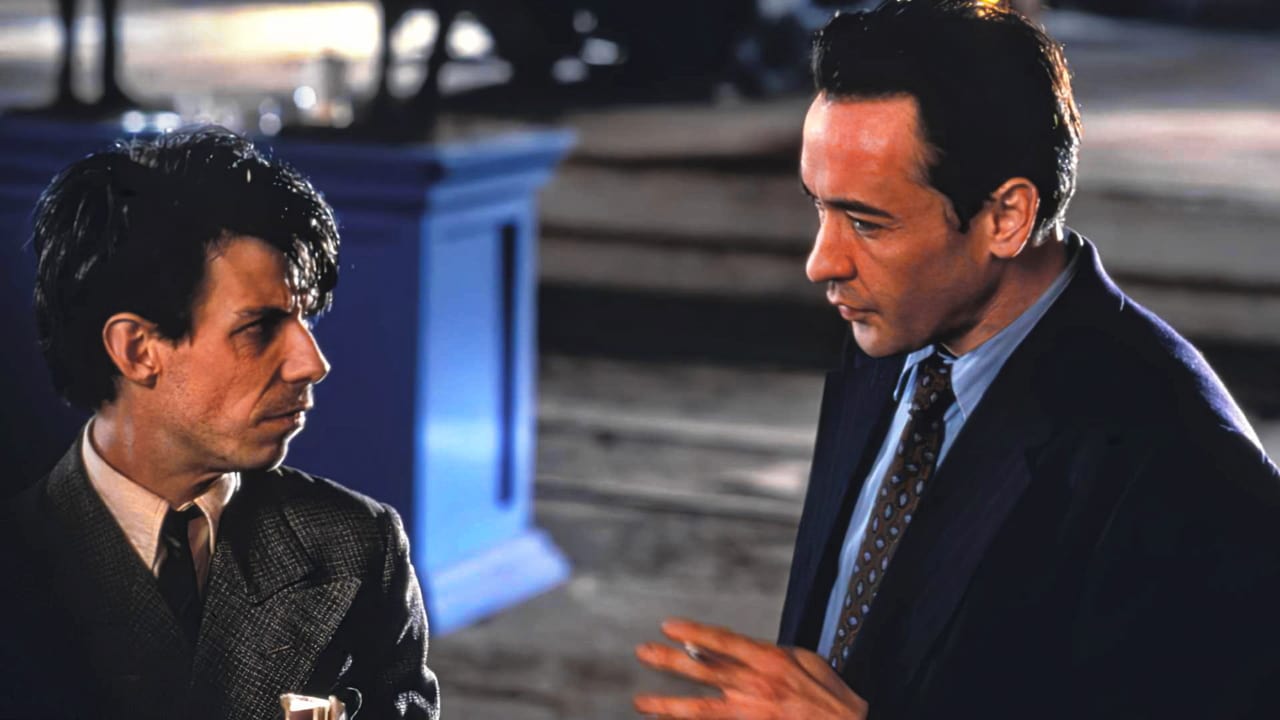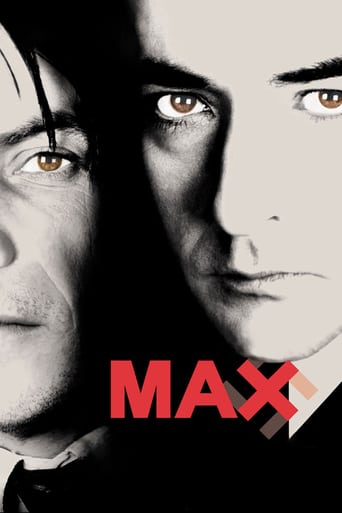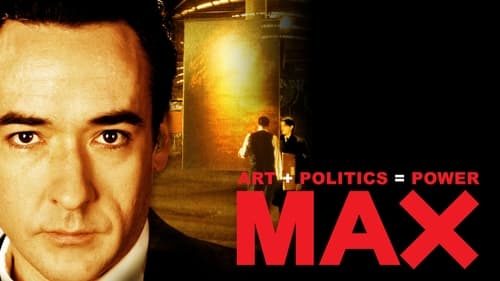



The greatest movie ever made..!
Slow pace in the most part of the movie.
It is a performances centric movie
One of the most extraordinary films you will see this year. Take that as you want.
View MoreWhy on Earth was this film made? I mean, really? Didn't anyone stop to think about what they were doing? In this fantasy tale in we get to see Adolf Hitler as a tortured artist. But here's the problem. This story didn't happen. And why in heaven's name do we need to see a fantasy about, for God's sake, Adolf Hitler? Don't get me wrong. I'm not offended per se by never-coulda-happened movies about Adolf Hitler. I loved "Hitler Dead or Alive." "Inglorious Basterds" was a wonderful thrill ride. But when you film an earnest character study about the formative years of the fellow who becomes the greatest evil ever known, you owe it to your audience to ground the story in reality.Things LIKE this story happened. But not this particular story. So we wind up with something so incredibly false that when I sat in my living room watching it on cable TV last night my jaw about fell open. And running through my head was the title song from "Springtime for Hitler," that brilliant musical-within-a-movie from "The Producers." At least we knew that was supposed to be a joke.I read a book years ago about Hitler's starving-artist period, and as the movie began I thought this might be an interesting story about a little-known chapter of Hitler's life. But any illusion I might have had about the movie's reality was dispelled when I saw John Cusack listening to an early-'30s tombstone radio (in 1919!), to a radio report about the signing of the Treaty of Versailles. Umm, radio broadcasting started in 1920; newscasts came later. It's sort of like seeing a movie in which Lewis and Clark settle in for the winter and spend it playing Super Mario Brothers.That was when the truth began to dawn on me, and I put the movie on pause to check the Internet and confirm my suspicion. Yes, they were making the whole thing up.From that point I watched with a growing sense of horror. Like when Hitler explains that his political speeches are actually a new form of art. Or when I watched John Cusack deliver the line, deadpan, "You're a hard man to like, Hitler." We see Hitler in 1920 or so sketching his plans for the Nuremberg rally of 1936 and for the shimmering imperial city we know from the never-built blueprints of Albert Speer. His buddy Cusack, an art dealer, delightedly pronounces them "future kitsch!" So Hitler readies them for an art exhibition that never comes off -- and because it doesn't happen he takes a different path and becomes Fuhrer instead. And the Astoundingly Manipulative Coincidence that ends the movie is really, really just too much to bear.This movie is so wretched in its conception, so appalling in its construction, and so serious about it all, that it deserves a place of honor among the worst films of all time. Heartily recommended for fans of "Plan Nine From Outer Space," but now that I've seen it I'll skip a repeat showing and go watch Hogan's Heroes instead.
View More"The Jewish doctrine of Marxism rejects the aristocratic principle of Nature and replaces the eternal privilege of power and strength by the mass of numbers and their dead weight. It denies the value of personality in man, contests the significance of nationality and race, destroys culture and brings only chaos. If, with the help of his Marxist creed, the Jew is victorious over the other peoples of the world, his crown will be the funeral wreath of humanity. Hence today I believe that I am acting in accordance with the will of the Almighty Creator: by defending myself against the Jew, I am fighting for the work of the Lord!" - Hitler ("Mein Kampf") An interesting film by writer/director Menno Meyjes, "Max" stars John Cusack as Max Rothman, a Munich art dealer who befriends a young Adolf Hitler in the decades preceding World War 2."Max's" first act watches as Rothman and Hitler comically interact, their cheerful dialogue darkly foreshadowing Hitler's late-career atrocities. Meyjes then paints Hitler as an artist offended by burgeoning modernist and avant-garde art movements. Such movements, which Hitler associates with Jews, progressives, communists, radicals and with artists who seek to challenge more conservative traditions, prove wholly disgusting to the young Hitler. To Hitler, avant-garde art is disruptive, unsettling, challenging and confrontational. It "loosens" and "perverts", whilst Hitler wishes for "order" and "cohesion". In Meyjes' hands, Hitler's is portrayed, not only a fervent nationalist, but a man who seeks to conjure up a romantic, idealised image of a great German Empire. Hitler's vision isn't only a political vision, but a full fledged art manifesto; a desire to make real a very nostalgic, sentimental image of a unified Mother Germany. Other artists denounce Hitler. His vision is kitsch, they say. And they're right. But like many artistic hacks, Hitler nevertheless makes real his designs through sheer will and determination.Many critics have labelled "Max" a playful bit of speculation, but Meyjes' Hitler is more psychologically true to the real Hitler than most other interpretations (his is perhaps the best on-screen Hitler since Chaplin's "The Great Dictator"). Some history: Germany's monarchs, most of whom were related to monarchs in Britain, Russia and across Europe, found themselves in the late 1800s losing power. In many countries, similar aristocracies were being contested by worker or other political movements. Those monarchs who held on to their power typically did so by amping up nationalist fervour and cooking up fake wars as a means of distracting their populaces. Jump ahead several decades, and Germany has been shattered during WW1 and finds its ruling class losing power. Into this cocktail steps Hitler, an ultra right-winger who is adored, not only by the rulers of Germany, Britain and the West, but the working class in Germany and America (though fascism is largely petite bourgeois). The German masses love him because he promises a stronger Germany. Western regular Joes, meanwhile, love him because he's standing up to the "bullies" of Britain and France. The elites in the West, meanwhile, adore Hitler because he's the capitalist's best friend, crushing progressive worker movements, which he'd liken to "Jewish parasites". In a very real sense, Hitler was capitalism's reactionary ideal, the market despot who promises to eradicate unions at home and the communist juggernaut to the north.Meyjes doesn't go directly into politics, though, but instead focuses on Hitler's hatred of avant-garde art. To Hitler, modernist art is "Jew art", it is "disruptive" and seeks to "change the nature of Germany". Hitler becomes obsessed with "keeping Germany clean" and "pure", its bloodlines "untainted" and "free from Jewish contagions." Western history, for very specific reasons, tends to stop at this aspect of Hitler's racism. To many, Hitler was simply "irrationally racist". What is omitted – because it points to complex levels of complicity – is what exactly "Jew infestation" meant to Hitler. Yes, on one level, such racism was a fantasy bogeyman; an illusion or scapegoat. But on the other, German and Western rulers genuinely feared "the Jews", who were associated with communists, Marxists and (the original) Bolsheviks, despite these movements' majorities not being Jewish. In an ironic reversal of historical prejudices, in which "the Jew" was the "evil capitalist" par excellence, it was "the Jew" who was now seen to be coming to destroy the status quo. It was "the Jew" who would infect the markets, turn it inside out and bring the new plague. Hitler, and many others in Germany at the time, even blamed Jewish Marxists for Wilhelm 2's "dethronment" and loss in World War 1. Hitler's sentiments weren't just shared by Germans in power, but Pope Pius XI, who advised Europe and the West to work with Hitler and Mussolini in a coalition to stop "cultural Marxism" ("Kulturbolschewismus"), and most other Western world leaders; Winston Churchill, for example, praised Hitler, Mein Kampf and sucked up to Mussolini.Historian L.M James makes it very clear why Hitler's racism must continue to be "diluted". Contemporary capitalism's rationales and arguments have always been the same arguments espoused by the world's Hitlers. Thus, capitalism must portray itself as "natural", and must, in its paranoia, portray all alternatives as a form of "chaos" which turns people into "dead weight", denies "individualism", contests "national boundaries", is "against God" and is practised by "corruptive deviants" (the "commie", the "Jew", the "Marxist", the "pinko") who want to "destroy traditions" and "pervert our culture" (with crazy things like "civil rights").Unusual for such films, "Max" forces us to sympathise with Hitler. Meyjes' Hitler, brilliantly played by Noah Taylor, is a pitiful little thing; an angry rodent who internalises persecution and then redirects it outward, ten-fold. As the film progresses, Hitler's iconic moustache grows, his back straightens and he becomes fitted with stylish Hugo Boss; the germination of a monster.8.5/10 – Worth two viewings.
View MoreIn the year 1918 a man named Adolf Hitler wants to become an artist.Maybe a Jewish art dealer named Max Rothman would help him in achieving his dream.But soon Hitler finds out that politics is the new art.And what would work better for the crowds than the anti-Semitism? Max (2002) is the first movie Menno Meyjes both wrote and directed.John Cusack does brilliant job as Max Rothman, a character who didn't actually exist.Noah Taylor is terrific as Adolf Hitler, a role not everyone can do.Leelee Sobieski is marvelous as Liselore Von Peltz, Max' lover.Molly Parker does very fine job as Max' wife, Nina Rothman.Ulrich Thomsen is very good as Captain Mayr.Great job by David Horovitch and Janet Suzman, who play Max' parents.Max shows two frustrated men.Max Rothman is frustrated because he lost his right arm in the World War I, Hitler is frustrated his dream of becoming an artist just isn't going to happen.This movie shows another side of Hitler.We don't see the rampaging monster who wanted to put every Jew in the concentration camp and have them killed.This Hitler what we see here is a man who wanted to be an artist.I heard recently that some of his paintings were found in a farm in Austria.Those paintings are going on sale.Of course I would never have a Hitler on my wall, no matter how good of an artist he was.One might ask does this movie humanize Hitler too much.When you take off the monster's cloak, what does he become? A human? You can ask that from yourself.
View MoreExploring the fictive "what-if" scenario,if Hitler had pursued art, if he hadn't been destitute and dis-illusion ed from World War I and its affect on Germany... And so on.Several reviews have commented that the film is dark and depressing. Well, it should be. The era was at it darkest for the reflection of inhumanity and atrocities committed in the name of war.John Cusack is good as Max Rothman,a man who returns from the first world war, to a comfortable art gallery business, and loving family. Noah Taylor as Hitler is disturbing and effective, at first attempting to create his own avant-Gard art, then feeling futile, then enraged at society.This transforms to a greater evil once several war mongers and propaganda peddlers recruit Hitler to fuel the fire of war and hatred, discrimination and ignorance.The film is informative, sad and poignant.The visuals are stark, incredible photography of architecture and the cold weather of central Europe.What we do not learn from history we are condemned to repeat. It strikes me while writing this how ignorance and hatred is still used in politics today, and this truly scares me. Highly recommended. 9/10.
View More